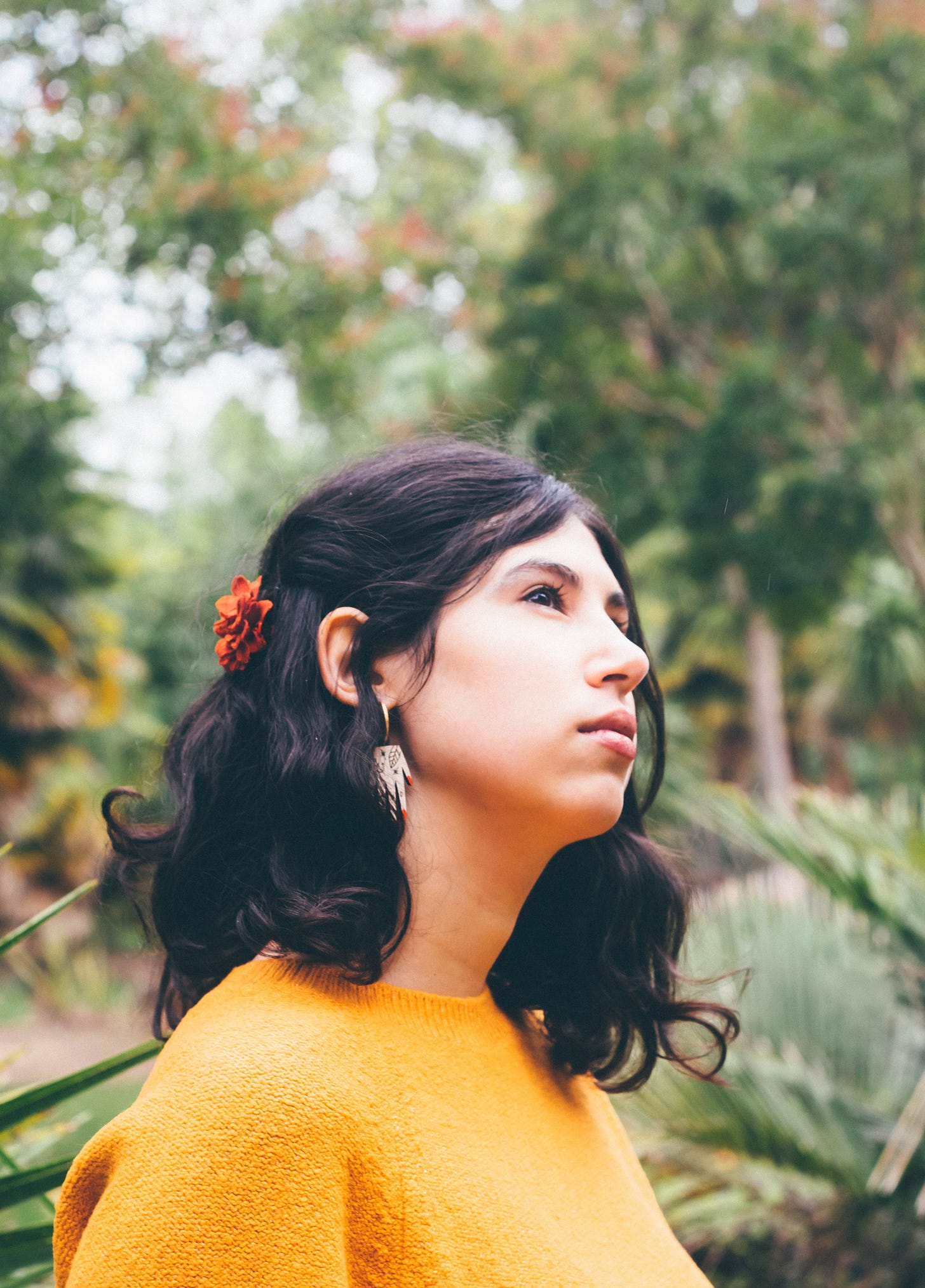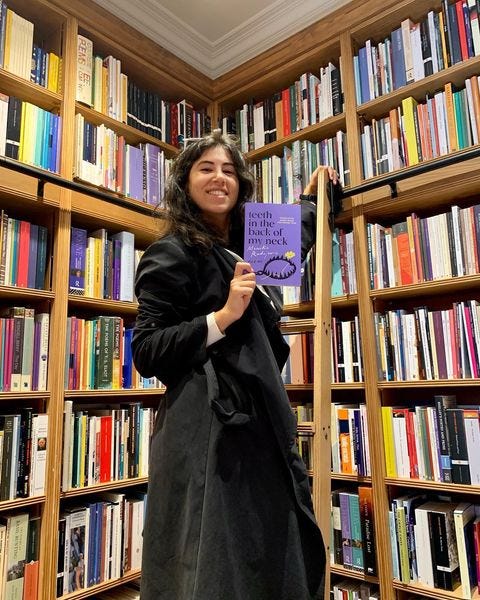Monika Radojevic: “Maybe that’s the mixed-race experience, the tiny moments you carry forever”
The poet on the significance of travel, mixedness as transgression and the heavy waters we carry
Hi, welcome back to Mixed Messages! This week I’m speaking to poet Monika Radojevic, who is of Brazilian and Montenegrin heritage. Monika was one of the inaugural winners of the #Merky Books New Writers' Prize with a collection that explored identity, ancestry and history. In our conversation, Monika spoke so lyrically about mixed-heritage identity, pulling in the social, historical and financial contexts that influence how we might feel about ourselves. Read her powerful story below.
How do you define your racial identity?
I’m still figuring that out. Maybe I’m going to spend the rest of my life figuring that out. I would say that I have mixed heritage. When people ask me where I’m from, I’ll give them multiple answers depending on the situation. If it’s people I know and trust, I’ll say I’m half-Brazilian, half-Montenegrin. I was born in the UK, I grew up with a mixture of languages and cultures. I identify as being British, but also very strongly as being more than that, as belonging to both Brazil and Montenegro.
I'm not sure exactly what I am because my parents don't necessarily have that information either, on my mother’s side because her own mother was adopted. Her grandma was indigenous. There were no adoption records. To make sure that I’m not claiming a title that I might not have the right to claim, I stick to mixed-heritage where I feel a bit more comfortable and like there's more space for nuance.
Have you spoken to your family about your mixedness?
We have those conversations quite a bit. The sad reality is that the older I get, the less I can travel to those countries and those relatives that I grew up with pass away. The more fractured and tenuous those connections become, the more important those identities become.
These conversations are useful and good, but my parents fundamentally don’t understand. For them, they feel comfortable in their histories, growing up with those languages and cultures. They say things like “you were born in the UK, you’re British, that’s fine,” and it’s definitely not.
Have you got siblings?
I do. My older sister is disabled. She has her own identities to question and her heritage of not one of them. My brother is very young, so he’s not quite at the stage of guessing his heritage. Hopefully it’s an experience we can talk about when he’s a bit older.
Has your sense of self and identity been quite consistent for you?
I think it’s definitely shifted. When I was a kid, there were a handful of racist experiences, but they’re not the norm for me. That’s a privilege of being white-passing. But I didn’t feel like I had to question it because I didn’t realise that it wasn’t normal or common to live in a house with multiple languages and cultures, where you didn’t need to have those conversations of being half-this or half-that. Both of my parents are very proud of their identities, and they never felt the need to hide that.
We grew up in an affluent situation where every year I could go back to Brazil and Montenegro in the holidays. I would see my families and reconnect with that side of me and practise my language. Even though I live in the UK, I have many homes and I’m OK with that. The financial crisis impacted my family as my parents run a small business. There were times when we couldn’t afford to go to Brazil. We still managed to go to Montenegro.
I forgot how important it was to go back until the distance had grown so strong and so great that suddenly going back took on a lot more significance. I haven't been to Montenegro for five years. I haven't been to Brazil for almost a decade. And in that space, people have died. People have got married, moved on, had babies, left the country… so much has changed. We’ve sort of been left behind from that change. That has really forced me to confront how I feel.
I think I’m edging towards a place of being ok with never fully understanding where I come from, and that is enough for now.
I’d be really interested to hear how your identity plays a part in your work.
In my work, I’ve been drawn to so many different perspectives and experiences, not just ones that relate to me. I have a whole lifetime of practice of connecting to people who aren’t from my background and don't share the same stories as me and I think that's made me quite an empathetic person, with curiosity and openness. I think you see everyone’s experiences as valid and important from the get go.
Writing poetry gives me a very deep concern about the world and the problems that happen. I feel like they impact me, even if it’s from a country I have no connection to. I think the reason why is because I see myself as part of the world. I’m not tethered to one place. My perspective is global, it's not built just in one community in one place.
The way I became a published poet was to win the #Merky New Writer’s Prize with my poetry about DNA testing kits, 23 and Me. In that, I speak frankly about feeling like you’re dissected on a butcher’s table, having to decide that “this shoulder is from this part of me, my leg is from here.” There’s also the fear of doing a DNA test, because maybe it will tell me that I'm not the person that I think I am, and maybe I have far less claim to the heritage that I have such a connection to. If that happens, who am I? Does that completely undermine everything I think about myself? Exploring that has been a key part of my work.
I think it also means I'm quite comfortable existing in grey spaces, not always having a very strong deciding opinion on one side. I am very opinionated, but I am more comfortable saying “I do not know the right answer here, I find many of these arguments compelling. I exist somewhere along all of them.” Maybe it comes from that feeling of, you're always sort of wrong. I think it also means that I'm a bit more of a risk taker – I’ll explore those uncomfortable spaces as respectfully as possible.
Do you think there are any stereotypes of what it means to be mixed?
It’s the idea of transgression, “you’ve stepped outside of what we think is acceptable.” The child is the result of that transgression, which is a horrible premise to begin anything on. I’ve not personally had to deal with stereotypes because there are very few half-Brazilian half-Montenegrin people, I escaped from that in lots of ways.
I want to talk about the joy of having family from all different places and how speaking multiple languages has shaped my perspective. Don't ask me about which country I prefer or if I know every single thing about specific Brazilian politics. It feels like a test. Ask me about the hard stuff, but I want to talk about how my experience has shaped me. Rather than loss, I want it to be about all of the things people gain from having a society full of different and mixed experiences. It is an absolute privilege for this country to have the immigrants and the diversity that it does. I want that to be acknowledged.
We spoke earlier about how someone told you you were too beautiful to be half-white at a party. It’s trendy to say ‘oh, white people,’ and I say that with no judgement. I joke about white people all the time. I can imagine how uncomfortable or difficult it might be if one part of your heritage and one of your parents is being lumped into this entire race of ‘the bad ones.’ It also must be painful to hear racism from your parents.
The waters that we carry are so varied in heaviness, but the pot we carry them in holds a mixture of things, a big old sludge that you have to pour out a little bit sometimes. After that woman said that to you, she moves on and goes back to her life. But you take that little piece and carry it with you and add it to your bucket. You might never forget that. That’s maybe the quintessential mixed-race experience, the tiny moments you carry forever.
What’s one of the best things about being mixed?
From a personal perspective, it’s funny to have mixed heritage. To live in a house where your parents mispronounce things or bring odd perspectives to the table. To go back to one of your home countries and discover that your name is the name of a famous cartoon character in Brazil who has a best friend who is an onion, and that everyone makes jokes about it. It’s so rich, warm and funny. Sometimes there’s humour in heartbreak, we laugh at each other’s mistakes in my family and say things that don’t quite translate and create these beautiful expressions and words that are a mishmash of languages.
I think what’s really important as a person of mixed heritage is ritual. The specific type of juice that you’re going to serve at a family get together, the aunty that brings chocolates from Montenegro. That ritual is what I hold on to for my identity. We have an Easter tradition where you dye and decorate eggs, and one egg is kept on for the whole year. I thought these rituals were weird when I was younger – as I get older, I see them as important. It’s much more than the practice of dyeing an egg, it’s reaching back to your heritage, history and ancestors.
Can you sum up your mixed identity in a single word?
Limitless. Your experience is ever-expanding and ever-changing.
Monika Radojevic’s poetry collection, Teeth in the Back of my Neck, is out now. Next week I’ll be talking to artist and Love Island star Jack Fowler. Subscribe to get Mixed Messages in your inbox on Monday.
Enjoy Mixed Messages? Support me on Ko-Fi! Your donations, which can start from £3, help me pay for the transcription software needed to keep this newsletter weekly, as well as special treats for subscribers.
Mixed Messages is a weekly exploration of the mixed-race experience, from me, Isabella Silvers. My mom is Punjabi (by way of East Africa) and my dad is white British, but finding my place between these two cultures hasn’t always been easy. That’s why I started Mixed Messages, where each week I’ll speak to a prominent mixed voice to delve into what it really feels like to be mixed.








"The more fractured and tenuous those connections become, the more important those identities become." I felt that. My family's from Argentina, and I haven't seen some of them in 20 years. Argentinian culture has never been more important to me. I reach out for it because it feels like it's slipping through my fingers.